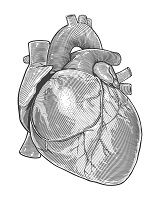Article
Journal Tallies Top 5 Cardiology Stories
Author(s):
The Journal of the American College of Cardiology named its biggest hits in 2014, based on papers most frequently accessed from its site. A blood test to rule out heart attack, an advisory about guidelines for preventing high blood pressure, cutting edge research on a new class of cholesterol drugs, and a study that found benefits in early surgery for mitral regurgitation were among the winners.

The Journal of the American College of Cardiology named its biggest hits in 2014, based on papers most frequently accessed from its site.
A blood test to rule out heart attack, an advisory about guidelines for preventing high blood pressure, cutting edge research on a new class of cholesterol drugs, and a study that found benefits in early surgery for mitral regurgitation were among the winners.
The list “is one way to reflect on the year in cardiology,” the organization note.
And the winners are:
· Undetectable High-Sensitivity Cardiac Troponin T Level in the Emergency Department and Risk of Myocardial Infarction.
o Patients presenting to the emergency department with an undetectable level of high-sensitivity cardiac troponin T, and whose ECGs show no sign of restricted blood flow, have a minimal risk of heart attack within 30 days. The probability that patients with an undetectable level of the blood biomarker are not at risk was 99.8 percent for heart attack and 100 percent for death.
· An Effective Approach to High Blood Pressure Control: A Science Advisory from the American Heart Association, the American College of Cardiology, and the Centers for Disease Control and Prevention
o This advisory calls on health care providers to work in close partnership with patients and to prioritize patients with high blood pressure who are receiving treatment but haven’t achieved their target blood pressure. The advisory encourage a team-based approach to care as well as evidence-based hypertension treatment algorithms and standardize protocols.
· Long-Term Benefit of Early Pre-Reperfusion Metoprolol Administration in Patients with Acute Myocardial Infarction: Results from the METOCARD-CNIC Trial (Effect of Metoprolol in Cardioprotection during an Acute Myocardial Infarction).
o Conclusions: In patients with anterior Killip class ≤II STEMI undergoing pPCI, early IV metoprolol before reperfusion resulted in higher long-term LVEF, reduced incidence of severe LV systolic dysfunction and ICD indications, and fewer heart failure admissions.
· Early Surgery Versus Conventional Treatment for Asymptomatic Severe Mitral Regurgitation: A Propensity Analysis.
o Conclusions: Compared with conservative management, early surgery is associated with significant long-term reductions of cardiac mortality and cardiac events in asymptomatic severe MR. These benefits were evident among patients age 50 years of age and older.
· Anti-PCSK9 Monotherapy for Hypercholesterolemia: The MENDEL-2 Randomized, Controlled Phase III Clinical Trial of Evolocumab.
· Conclusions: In the largest monotherapy trial using a PCSK9 inhibitor to date, evolocumab yielded significant LDL-C reductions compared with placebo or ezetimibe and was well tolerated in patients with hypercholesterolemia.
A longer list of popular articles from both JACC and its specialty publications is available on its site.





